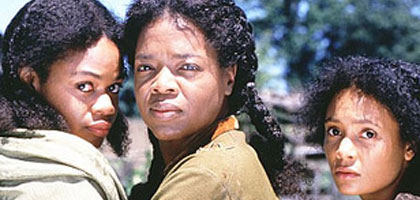
Too natural
Film of the Month: Beloved

Beloved may have too many mothers caring for it, but Charlotte O'Sullivan believes that the problem child brings some joy
Toni Morrison's novel Beloved is an extraordinary feat, a version of the judgement of Solomon. In the Bible story we learn that a natural mother would do anything rather than see her child cut in two. Morrison's project is to show how Sethe, a former slave, when pushed to nightmarish extremes could fight for the right to commit the bloody act herself.
Unfortunately, the film of the book seems to have aroused similar passions. Its parentage is also contested: is this an Oprah Winfrey project (Winfrey, one of the film's co-producers, has been nursing this baby for over a decade), or a Jonathan Demme movie? As a result it doesn't quite fit together. It's impossible, of course, to know who exactly did what, but it feels as if Winfrey claimed as her own the parts concerning her character Sethe and Sethe's mother Baby Suggs (Beah Richards), while Demme adopted Beloved (Thandie Newton), the title character who may or may not be a reincarnation of the daughter Sethe slaughtered rather than let her become a slave. Either way, both Winfrey and Demme get a lot wrong. Winfrey, for instance, should never have cast herself in the lead. She is very good in some scenes, but she is never startling or overwhelming, her pleasant, sturdy face capable of projecting only one feeling at a time.
More importantly, she has altered the contexts surrounding Sethe and Baby Suggs. We never learn, for instance, how Beloved's gravestone gets her name carved on it (in the book, Sethe has to have sex with the stonecutter). It's as if such a detail might sully our notion of the noble Sethe. Nor do we see, or even hear about, the magnificent party which in the book alienates the community from the two women. Essentially Sethe and Baby Suggs' beneficence makes the townspeople fizzle with jealous rage. As a result, they don't warn the two women of sadistic slave-owner Schoolteacher's imminent arrival. A crucial passage in the book, the party demonstrates the limits of both the group and the individual. By leaving this out, a myth is kept alive: if you need it, the group will be there for you, while the big-hearted female can never give too much of herself. This is the logic of The Oprah Winfrey Show - too quick and easy by half.
This emphasis on the 'empowering', supportively spiritual female (Baby Suggs' sermons also feature heavily) unbalances the film. Lost are the male stories in the book, an irony given that when Beloved was first published, a number of critics accused Morrison of undermining black men. Denzel Washington allegedly turned down the role of Paul D on the grounds that there was too much bowing and scraping in the role. Such a view bristles with machismo, but in the film, somewhere along the line, black men have been pushed to the sidelines.
Danny Glover plays the part beautifully, but Paul D's individual story (about how he escapes from a chain gang in Georgia, just as he's decided to risk death rather than fellate a white guard) has disappeared. So too has Stamp Paid's explanation for how he got his name. On the written page, the words 'Stamp Paid' can almost explain themselves - heard, their significance can easily be missed. Beloved the film doesn't have room for the autonomous black male, and ironically this makes the triumphs of its black women less impressive. When Glover tells Winfrey, "you your best thing", the uncharitable thought surfaces: she doesn't need convincing of that.
Director Demme is just as guilty of recreating the film in his own image. For Beloved's birth scene, for example, we're plunged into the beautiful, surreal rankness of The Silence of the Lambs (not surprisingly, the two films share the same cinematographer, Tak Fujimoto). Silence's killer's basement hideout crawls with insects; Beloved, similarly, is surrounded by fluttering wings and her body covered inch-thick with ladybirds (not in the book). Later, she drapes herself against a tree and her serpentine awkwardness - a mixture of shamelessness and self-disgust - remind one of Demme's psychopath.
Much work has gone into Newton's Beloved, perhaps too much. Her voice - like something out of The Exorcist - at first works well (combined as it is with bouts of enchanting, wide-eyed sweetness) but soon becomes distracting. In the book, the hope that Beloved can be made happy keeps flaring into life; here, thanks to that monster-voice, it's impossible not to realise she's trouble. Furthermore, it makes her seem culturally rootless. In the book she gradually begins to talk like the rest of the family and develops a poetic, sophisticated point of view. In the film her charisma is entirely other-worldly and we never identify with her. She's just wonderful and scary to watch. This one-note performance, though, is all of a piece with Demme's gothic-horror vision. The wigs get more demented and determinedly unreal by the minute. He even gives her pearly, vampiric teeth. It's as if whenever Beloved is before the camera Demme is back producing colourful exploitation for Roger Corman.
Luckily, there are a number of scenes which seem to belong neither to Demme nor to Winfrey, but to embody the best of both. The family's trip to the carnival, for example, transforms a fairly insignificant part of the book into a bold, haunting set-piece. It looks just right, not a soft thing in sight (even the sky looks like a rough piece of metal). Best of all, potentially big points - such as the irony of ex-slaves being entertained by the sight of white "freaks" - are not rammed home. Chains and rusty prison bars are allowed to sink in slowly or not at all (for once, even the music is low key). It's the bright, grimly carnal colours that stay with you, colours which contrast with the shots of wildlife that crop up throughout the film, of animals roaming free and not a human in sight. Often such visions are beautiful, often they're ugly (such as two tortoises mating, wrinkled necks stretched to breaking point). In either case, the screen feels too full. We pull back, overwhelmed as if by an obscenity. What Fujimoto does so well is to produce a natural landscape that appears unnatural, or too natural. Beloved captures what Morrison has to put into words: that once we become accustomed to slavery, freedom becomes frightening and strange.
Implicating the audience in such thinking is the film's real achievement. Beloved may be as discombobulated as the flesh-and-blood ghost herself, but its various bits and pieces prove fascinating (contrary to advance warning, its three hours do go quickly).
